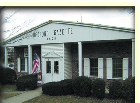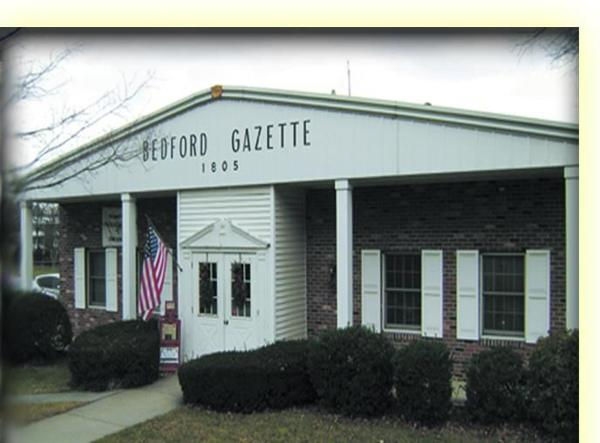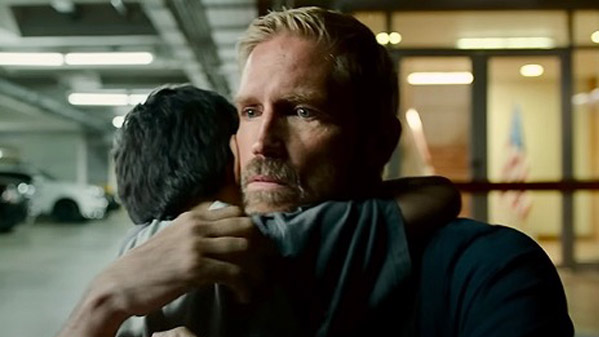What is QAnon?
QAnon is described by the Southern Poverty Law Center as an "umbrella term for a sprawling spiderweb of right-wing internet conspiracy theories with antisemitic and anti-LGBTQ elements that falsely claim the world is run by a secret cabal of pedophiles who worship Satan and are plotting against President Trump. ... QAnon believers falsely claim the cabal is abducting children to kill them and harvest their blood for a chemical known as adrenochrome, which is used to extend their lives."
"Sound of Freedom" does not mention QAnon or any issues that are politically partisan.
Now you know. 🙄


Deuteronomy 7
https://www.biblestudytools.com/deuteronomy/7.html
Driving Out the Nations
1 When the LORD your God brings you into the land you are entering to possess and drives out before you many nations—the Hittites, Girgashites, Amorites, Canaanites, Perizzites, Hivites and Jebusites, seven nations larger and stronger than you— 2 and when the LORD your God has delivered them over to you and you have defeated them, then you must destroy them totally. Make no treaty with them, and show them no mercy. 3 Do not intermarry with them. Do not give your daughters to their sons or take their daughters for your sons, 4 for they will turn your children away from following me to serve other gods, and the LORD’s anger will burn against you and will quickly destroy you. 5 This is what you are to do to them: Break down their altars, smash their sacred stones, cut down their Asherah poles and burn their idols in the fire. 6 For you are a people holy to the LORD your God. The LORD your God has chosen you out of all the peoples on the face of the earth to be his people, his treasured possession. 7 The LORD did not set his affection on you and choose you because you were more numerous than other peoples, for you were the fewest of all peoples. 8 But it was because the LORD loved you and kept the oath he swore to your ancestors that he brought you out with a mighty hand and redeemed you from the land of slavery, from the power of Pharaoh king of Egypt. 9 Know therefore that the LORD your God is God; he is the faithful God, keeping his covenant of love to a thousand generations of those who love him and keep his commandments. 10 But those who hate him he will repay to their face by destruction; he will not be slow to repay to their face those who hate him. 11 Therefore, take care to follow the commands, decrees and laws I give you today. 12 If you pay attention to these laws and are careful to follow them, then the LORD your God will keep his covenant of love with you, as he swore to your ancestors. 13 He will love you and bless you and increase your numbers. He will bless the fruit of your womb, the crops of your land—your grain, new wine and olive oil—the calves of your herds and the lambs of your flocks in the land he swore to your ancestors to give you. 14 You will be blessed more than any other people; none of your men or women will be childless, nor will any of your livestock be without young. 15 The LORD will keep you free from every disease. He will not inflict on you the horrible diseases you knew in Egypt, but he will inflict them on all who hate you. 16 You must destroy all the peoples the LORD your God gives over to you. Do not look on them with pity and do not serve their gods, for that will be a snare to you. 17 You may say to yourselves, “These nations are stronger than we are. How can we drive them out?” 18 But do not be afraid of them; remember well what the LORD your God did to Pharaoh and to all Egypt. 19 You saw with your own eyes the great trials, the signs and wonders, the mighty hand and outstretched arm, with which the LORD your God brought you out. The LORD your God will do the same to all the peoples you now fear. 20 Moreover, the LORD your God will send the hornet among them until even the survivors who hide from you have perished. 21 Do not be terrified by them, for the LORD your God, who is among you, is a great and awesome God. 22 The LORD your God will drive out those nations before you, little by little. You will not be allowed to eliminate them all at once, or the wild animals will multiply around you. 23 But the LORD your God will deliver them over to you, throwing them into great confusion until they are destroyed. 24 He will give their kings into your hand, and you will wipe out their names from under heaven. No one will be able to stand up against you; you will destroy them. 25 The images of their gods you are to burn in the fire. Do not covet the silver and gold on them, and do not take it for yourselves, or you will be ensnared by it, for it is detestable to the LORD your God. 26 Do not bring a detestable thing into your house or you, like it, will be set apart for destruction. Regard it as vile and utterly detest it, for it is set apart for destruction.
Study Notes: These will be added as I am able.
7:2 God told the Israelites to destroy their enemies totally. How can a God of love and mercy wipe out everyone, even children? Although God is living and merciful, he is also just. These enemy nations wereas much a part of God's creation as Israel was, and God does not allow evil to continue unchecked. God had punished Israel by keeping out of the promised land all those who had disobeyed. The command to destroy these nations was both a judgment (9:4-6) and a safety measure. On one hand, the people living in the land were being judged for their sin, and Israel was God's instrument of judgment--just as God would one day use other nations to judge Israel for its sin (2 Chronicles 36:17; Isaiah 10:12). On the other hand, God's command was designed to protect the nation of Israel from being ruined by the idolatry and immorality of its enemies. To think that God was too "nice" to judge sin would be to underestimate him.
7:5 Asherah was a Canaanite mother goddess of the sea, associated with Baal.
7.6 How did Israel deserve to be chosen above all other nations at that time? It was not a matter of Israel's merit, but of God keeping his promises to their ancestors. Just as God chose the nation of Israel, he has chosen all believers today to be a part of his treasured possession. Similarly, it is not because of our merit that we have come to faith in Christ. Instead, God chose us out of his goodness and grace.
7:21-24 Moses told the Israelites that God would destroy Israel's enemies, but not all at once. God had the power to destroy those nations instantly, but he chose to do it in stages. In the same way and with the same power, God could miraculously and instantaneously change your life. Usually, however, he chooses to help you gradually, teaching you one lesson at a time. Rather than expecting instant spiritual maturity and solutions to all your problems, slow down and work one step at a time, trusting God to make up the difference between where you should be and where you are now. You'll soon look back and see that a miraculous transformation has occurred.
7:25, 26 Moses warned Israel against becoming ensnared by the idols of the defeated nations by coveting the silver or gold on them. We may think it's all right to be close to sin as long as we don't participate. "After all," we say, "I won't do anything wrong!" But being close can hurt us as we become attracted and finally give in. The only sure way to stay away from sin is to stay away!
It is hard to comprehend God's divine justice. The only way to even attempt to is to first recognize His sovereignty. It is futile to go against God. Then, when one starts thinking about God's other attributes--Allknowing, Truth, Unchanging, Love--we can see that His judgments are completely true, just, and fair. When God sent His only Son to show us the Way, God showed that His justice is applied equally to all who believe. If you think about God being outside of time and space, we are all prejudged. He knows His own, those that love Him. Obedience follows. And eventually all God's enemies are put under His feet. God is sovereign. God Wins.
Almighty Creator of All, thank You for this day. Let us rejoice in Your sovereignty and be thankful that You are in control. Lord, we sometimes make a mess of things in our arrogance and ignorance. Let us awaken to the truth of these messes and clean them up--with Your help and guidance. Give us strength, Lord, from Your never-ending supply. Give us courage from the knowledge of Your Sovereignty--that You do NOT "allow evil to continue unchecked". Enable us, equip us, guide us, and work through us, Lord, so that Thy good and steadfast will is done on earth. Keep us to our tasks. In Jesus' holy name, Amen.
A Song: https://youtube.com/watch?v=alYxWu554ac
Have a blessed day.




Deuteronomy 6
https://www.biblestudytools.com/deuteronomy/6.html
Love the LORD Your God
1 These are the commands, decrees and laws the LORD your God directed me to teach you to observe in the land that you are crossing the Jordan to possess, 2 so that you, your children and their children after them may fear the LORD your God as long as you live by keeping all his decrees and commands that I give you, and so that you may enjoy long life. 3 Hear, Israel, and be careful to obey so that it may go well with you and that you may increase greatly in a land flowing with milk and honey, just as the LORD, the God of your ancestors, promised you. 4 Hear, O Israel: The LORD our God, the LORD is one. 5 Love the LORD your God with all your heart and with all your soul and with all your strength. 6 These commandments that I give you today are to be on your hearts. 7 Impress them on your children. Talk about them when you sit at home and when you walk along the road, when you lie down and when you get up. 8 Tie them as symbols on your hands and bind them on your foreheads. 9 Write them on the doorframes of your houses and on your gates. 10 When the LORD your God brings you into the land he swore to your fathers, to Abraham, Isaac and Jacob, to give you—a land with large, flourishing cities you did not build, 11 houses filled with all kinds of good things you did not provide, wells you did not dig, and vineyards and olive groves you did not plant—then when you eat and are satisfied, 12 be careful that you do not forget the LORD, who brought you out of Egypt, out of the land of slavery. 13 Fear the LORD your God, serve him only and take your oaths in his name. 14 Do not follow other gods, the gods of the peoples around you; 15 for the LORD your God, who is among you, is a jealous God and his anger will burn against you, and he will destroy you from the face of the land. 16 Do not put the LORD your God to the test as you did at Massah. 17 Be sure to keep the commands of the LORD your God and the stipulations and decrees he has given you. 18 Do what is right and good in the LORD’s sight, so that it may go well with you and you may go in and take over the good land the LORD promised on oath to your ancestors, 19 thrusting out all your enemies before you, as the LORD said. 20 In the future, when your son asks you, “What is the meaning of the stipulations, decrees and laws the LORD our God has commanded you?” 21 tell him: “We were slaves of Pharaoh in Egypt, but the LORD brought us out of Egypt with a mighty hand. 22 Before our eyes the LORD sent signs and wonders—great and terrible—on Egypt and Pharaoh and his whole household. 23 But he brought us out from there to bring us in and give us the land he promised on oath to our ancestors. 24 The LORD commanded us to obey all these decrees and to fear the LORD our God, so that we might always prosper and be kept alive, as is the case today. 25 And if we are careful to obey all this law before the LORD our God, as he has commanded us, that will be our righteousness.”
Study Notes: These will be added as I am able.
6:3 For a nation that had wandered for 40 years in a parched desert, a land flowing with milk and honey sounded like paradise. It brought to mind rich crops, rushing streams, gentle rains, and lush fields filled with livestock. The Israelites could have had all that 40 years earlier. Numbers 13 and 14 explain how the people missed their chance. Now Moses was determined to help the people avoid the same mistake by whetting their appetite for the beautiful land and then clearly explaining the conditions for entering the land.
6:4 Monotheism--the belief in only one God--was a distinctive feature of Hebrew religion. Many ancient religions believed in many gods. But the God of Abraham, Isaac, and Jacob is the God of the whole earth, the only true God. This was an important insight for the nation of Israel because they were about to enter a land filled with people who believed in many gods. Both then and today, there are people who prefer to place their trust in many"gods." But the day is coming when God will be recognized as the only one. He will be king over the whole earth (Zechariah 14:9).
6:4-9 This passage provides the central theme of Deuteronomy. It sets a pattern that helps us relate the Word of God to our daily lives. We are to love God, think constantly about his commandments, teach his commandments to our children, and live each day by the guidelines in his Word. God emphasized the importance of parents' teaching the Bible to their children. The church and Christian schools cannot be used to escape from this responsibility. The Bible provides so many opportunities for object lessons and practical teaching that it would be a shame to study it only one day a week. Eternal truths are most effectively learned in the loving environment of a God-fearing home.
6:5 Jesus said that loving God with all of ourselves is the first and greatest commandment (Matthew 22:37-39). This command, combined with the command to love your neighbor (Leviticus 19:18), encompasses all the other Old Testament laws.
6:7 The Hebrews were extremely successful at making religion an integral part of life. The reason for their success was that religious education was life-oriented, not information-oriented. They used the context of daily life to teach about God. The key to teaching your children to love God is stated simply and clearly in these verses. If you want your children to follow God, you must make God a part of your everyday experiences. You must teach your children diligently to see God in all aspects of life, not just those that are church related.
6:10-13 Moses warned the people not to forget God when they entered the promised land and became prosperous. Prosperity, more than poverty, can dull our spiritual vision because it tends to make us self-sufficient and eager to acquire still more of everything--except God. The same thing can happen in our church. Once we become successful in terms of numbers, programs, and buildings, we can easily become self-sufficient and less sensitive to our need for God. This leads us to concentrate on self-preservation rather than thankfulness and service for God.
6:24 Does the phrase "so that we might always prosper" mean that we can expect only prosperity and no suffering when we obey God? What is promised here is a right relationship with God for all those who love him with all their heart. It speaks of a good relationship with God and the ultimate benefit of knowing him. It is not blanket protection against poverty, adversity, or suffering. We can have this right relationship with God by obeying his command to love him with all that we are.
This chapter is so beautiful. Think of how great the love of our Creator is. He commands us to love him totally. But He also gives us freedom to do so by our own choice. So, how shall we truly love Him? Can we truly love what we do not know? It seems we should seek to know Him. Jesus gives us that ability by studying his life, his death, and his resurrection and ascension. We can when the Holy Spirit of Truth works in our lives and in our hearts and minds. When we seek the truth, we are seeking God. When we expose truth, God is working through us. If we do this genuinely and honestly and consistently, there is no need to fear. "Peace I give to you. I do not give as the world gives. My peace I give to you." (John 14:27). Peace is the prize.
Heavenly Father, thank You for Your love. Thank You for all of Your creation. Help us do Your work on earth. Keep our focus on You. Let us grow in relationship with You. Let our hearts and minds be filled with Your love flowing through us to others. May our love be expressed with justice and righteousness. Make us become more and more like Your children. In Jesus' name, Amen.
A Song: https://youtube.com/watch?v=bOdymbiTIZ4
Have a blessed day.
Deuteronomy 5
https://www.biblestudytools.com/deuteronomy/5.html
The Ten Commandments
1 Moses summoned all Israel and said: Hear, Israel, the decrees and laws I declare in your hearing today. Learn them and be sure to follow them. 2 The LORD our God made a covenant with us at Horeb. 3 It was not with our ancestors that the LORD made this covenant, but with us, with all of us who are alive here today. 4 The LORD spoke to you face to face out of the fire on the mountain. 5 (At that time I stood between the LORD and you to declare to you the word of the LORD, because you were afraid of the fire and did not go up the mountain.) And he said: 6 “I am the LORD your God, who brought you out of Egypt, out of the land of slavery. 7 “You shall have no other gods before me. 8 “You shall not make for yourself an image in the form of anything in heaven above or on the earth beneath or in the waters below. 9 You shall not bow down to them or worship them; for I, the LORD your God, am a jealous God, punishing the children for the sin of the parents to the third and fourth generation of those who hate me, 10 but showing love to a thousand generations of those who love me and keep my commandments. 11 “You shall not misuse the name of the LORD your God, for the LORD will not hold anyone guiltless who misuses his name. 12 “Observe the Sabbath day by keeping it holy, as the LORD your God has commanded you. 13 Six days you shall labor and do all your work, 14 but the seventh day is a sabbath to the LORD your God. On it you shall not do any work, neither you, nor your son or daughter, nor your male or female servant, nor your ox, your donkey or any of your animals, nor any foreigner residing in your towns, so that your male and female servants may rest, as you do. 15 Remember that you were slaves in Egypt and that the LORD your God brought you out of there with a mighty hand and an outstretched arm. Therefore the LORD your God has commanded you to observe the Sabbath day. 16 “Honor your father and your mother, as the LORD your God has commanded you, so that you may live long and that it may go well with you in the land the LORD your God is giving you. 17 “You shall not murder. 18 “You shall not commit adultery. 19 “You shall not steal. 20 “You shall not give false testimony against your neighbor. 21 “You shall not covet your neighbor’s wife. You shall not set your desire on your neighbor’s house or land, his male or female servant, his ox or donkey, or anything that belongs to your neighbor.” 22 These are the commandments the LORD proclaimed in a loud voice to your whole assembly there on the mountain from out of the fire, the cloud and the deep darkness; and he added nothing more. Then he wrote them on two stone tablets and gave them to me. 23 When you heard the voice out of the darkness, while the mountain was ablaze with fire, all the leaders of your tribes and your elders came to me. 24 And you said, “The LORD our God has shown us his glory and his majesty, and we have heard his voice from the fire. Today we have seen that a person can live even if God speaks with them. 25 But now, why should we die? This great fire will consume us, and we will die if we hear the voice of the LORD our God any longer. 26 For what mortal has ever heard the voice of the living God speaking out of fire, as we have, and survived? 27 Go near and listen to all that the LORD our God says. Then tell us whatever the LORD our God tells you. We will listen and obey.” 28 The LORD heard you when you spoke to me, and the LORD said to me, “I have heard what this people said to you. Everything they said was good. 29 Oh, that their hearts would be inclined to fear me and keep all my commands always, so that it might go well with them and their children forever! 30 “Go, tell them to return to their tents. 31 But you stay here with me so that I may give you all the commands, decrees and laws you are to teach them to follow in the land I am giving them to possess.” 32 So be careful to do what the LORD your God has commanded you; do not turn aside to the right or to the left. 33 Walk in obedience to all that the LORD your God has commanded you, so that you may live and prosper and prolong your days in the land that you will possess.
Study Notes: These will be added as I am able.
5:1 The people had entered into a covenant with God, and Moses commanded them to hear, learn, and follow his statutes. Christians have also entered into a covenant with God (through Jesus Christ) and should be responsive to what God expects. Moses' threefold command to the Israelites is excellent advice for all God's followers. Hearing is absorbing and accepting information about God. Learning is understanding its meaning and implications. Following is putting into action all that we have learned and understood. All three parts are essential to a growing relationship with God.
5:7 A god is whatever people put first in their lives. Some people literally worship other gods by joining cults or strange religions. In a more subtle way, many of us worship other gods by building our lives around something other than the one true God. If your greatest desire is for popularity, power, or money, you are devoting yourself to something other than God. To put God first, (1) recognize what is taking his place in your life; (2) renounce this substitute god as unworthy of your devotion; (3) ask God for forgiveness; (4) restructure your priorities so that love for God is the motive for everything you do; (5) examine yourself daily to be sure you are giving God first place.
5:8, 9 How would you feel if someone took a picture of you, framed it, stared at it a lot, showed it to others, but completely ignored the real you? God does not want to be treated this way either. He wants a genuine relationship with us, not merely ritual. He wants us to know him. God knows that if we put anything other than him at the center of our lives, we will not reach our potential and become all that he wants us to be.
5:11 We are familiar with the sin to be avoided in this commandment, that we should not misuse the name of the Lord by saying it in an empty or worthless way. But there is also a good work that is commanded: to use God's name to praise him and ascribe to him glory. This is the opposite of misusing his name. While you might be able to keep yourself from swearing, how have you done at finding time to praise God and honor his name?
5:16 Obeying our parents is our main task when we are young, but honoring them should continue even beyond their death. One way to honor parents is to provide for them in times of financial need or when they are ill and unable to care for themselves. Perhaps the best way to honor them is to pass on their godly values to our children. Honoring involves all that sons and daughters do with their lives--the way they work and tal, the values they hold, and the morals they practice. What are you doing to show respect to your parents? Are you living in a way that brings honor to them?
5:17 "But I don't murder people," you may say. Good. That fulfills the letter of the law. But Jesus explained that hateful anger breaks this commandment (Matthew 5:21, 22). Have you ever been so angry with someone who mistreated you that for a moment you wished that person were dead? Have you ever fantasized that you could do someone in? Jesus' teaching concerning this law demonstrates that we are capable of murder in our hearts. Even if we are legally innocent, we are all morally guilty of murder and need to ask God's forgiveness. We need to commit ourselves to the opposite of hatred and anger--love and reconciliation.
5:21 To covet is to desire another person's prosperity. We are not to set our desires on anything that belongs to someone else. Not only can such desires make us miserable, they can also lead us to other sins such as adultery and stealing. Envying others is a useless exercise because God is able to provide everything we really need, even if he does not always give us everything we want. To stop coveting, we need to practice being content with what we have. The apostle Paul emphasizes the significance of contentment in Philippians 4:11. It's a matter of perspective. Instead of thinking about what we don't have, we should thank God for what he has given and strive to be content. After all, our most important possession is free and available to everyone--eternal life through Christ.
5:29 God told Moses that he wanted the people to incline their hearts to fear him--to want to respect and obey him. There is a difference between doing something because we want to. God is not interested in forced religious exercises and rule-keeping. He wants our hearts and lives completely dedicated to him. If we love him, obedience will follow.
God knows about why some of us resist being manipulated into belief in something. He knows about our reluctance even more fully than we do. He also knows our breakthrough moments, even if they have not yet come. True love cannot be fake. And, as the study note writer wrote, "If we love him, obedience will follow." It is way cool to experience this kind of growth personally.
Our heavenly Father, thank You for Your enduring love and guidance. Thank You that You are constant throughout all the upheavals of time. Thank You for Your patient tolerance as we grow in understanding and relationship with You. You know each of us uniquely and completely. You know all our relationships with others and the interconnectedness we have with each other and with those who came before us and those that will follow us. It just boggles the mind--the mind that You examine and know. Thank You for searching our hearts with and on purpose. We grow when You do. Help us to keep our covenants with You completely. In Jesus' holy name, Amen.
A Song: https://youtube.com/watch?v=ESmuG_5MOiw
Have a blessed day.


Deuteronomy 4:44-49
https://www.biblestudytools.com/deuteronomy/passage/?q=deuteronomy+4:44-49
Introduction to the Law
44 This is the law Moses set before the Israelites. 45 These are the stipulations, decrees and laws Moses gave them when they came out of Egypt 46 and were in the valley near Beth Peor east of the Jordan, in the land of Sihon king of the Amorites, who reigned in Heshbon and was defeated by Moses and the Israelites as they came out of Egypt. 47 They took possession of his land and the land of Og king of Bashan, the two Amorite kings east of the Jordan. 48 This land extended from Aroer on the rim of the Arnon Gorge to Mount Sirion (that is, Hermon), 49 and included all the Arabah east of the Jordan, as far as the Dead Sea, below the slopes of Pisgah.
There are no Study Notes for these verses. But there was an introductory paragraph, as these verses begin the next section, which my study Bible titled, "B. PRINCIPLES FOR GODLY LIVING: MOSES' SECOND ADDRESS (4:44--28:68). Here's what it says:
After reviewing the history of Israel's journey, Moses recounts the Ten Commandments and the other laws given to the Israelites at Mount Sinai. He urges them to obey the law and reminds them of the consequences of disobeying God's laws. The Ten Commandments and all of God's laws point out to us where we fall short and show us how we should act as God's people.
After seeing Sound of Freedom yesterday, it brings home the importance of having a moral compass. God doesn't leave us in chaos. He provides guidance if we would only recognize it and apply it to our thinking and living. Oh. Sometimes just an exhale will do for words.
Our heavenly Father, thank You for all those working to do Your will here on Earth. Thank You for Your guidance in the Ten Commandments. Thank You for our salvation through Your Son, Jesus, who perfectly fulfilled them. We fall short. But You still guide and show us mercy and love. Keep us trying, Lord, to follow You. Help us help You save Your children. In Jesus' name, Amen.
A Song: https://youtube.com/watch?v=hDQCJnXU108
Have a blessed day.






















